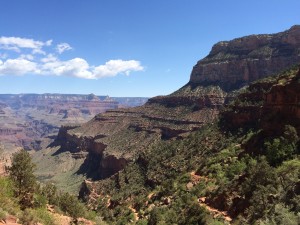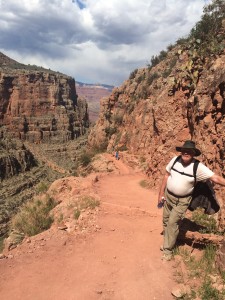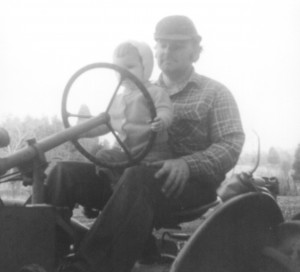Posted by Deborah Huso on Oct 2, 2015 in
Fathers and Daughters,
Men,
Musings,
Relationships Last winter I started dating a gentleman who had been in his chosen profession about two decades, was quite successful, financially solid, well-educated and well-spoken, courteous to a fault. He refused to permit me to pay for a single dinner out, not even once we’d gone on a few dates. Perfect, right?
Well, no….
I guess the first thing that struck me was when he gave me a tour of the new home he had purchased. When I inquired as to the residence’s heating and cooling system, he presented a blank look. “Is it a heat pump?” I asked.
“I don’t know,” he replied.
“How efficient? This is a pretty big house,” I continued.
He smiled a little nervously. “I’m not sure.”
Before I embarrassed him further, I declined to ask about SEER ratings. I mean, what was the point? He wouldn’t know the answer.
Granted, I’m a builder’s daughter and a sometime home and commercial construction writer as well as being an only child raised with all the practical skills one might typically think of a father bestowing on a son. And yes, I grew up outside a small southern mountain town where…you know…men were men. There was no such thing as a man who didn’t know how to drive a stick shift or a tractor (and plenty of women, myself included, counted these among our skills as well).
I could dismiss the above as a case of encountering a city-bred gentlemen of means who had grown up in a family of means where men’s hands remained soft and delicate as a painter’s or a pianist’s.
Only…my dad was a bank president’s son who grew up in town. And I honestly can’t think of anyone on the planet with a more practical set of skills and problem-solving ability than my father. He can repair a backhoe, build a house, and split firewood with gusto in the company of men less than half his age. He can also do trigonometry with a pencil on a block of wood and multiply fractions in his head.
I knew a lot of men like this growing up—my maternal grandfather, my great uncles, neighbors, friends’ fathers. You wouldn’t catch any of them not knowing how to change a flat tire or fix a broken fence…or apologizing for their outlook on the world. So I grew up with the idea that men should be strong, brave, practical, and smart… because I came of age surrounded by men who were teachers, mentors, fixers, and servants to others.
I know I’m going to get serious flak for saying this, but heck, I’m going to say it anyway—the emasculation of men is becoming the norm in our culture (and not just because there are a fair number now who not only wouldn’t deign to change a tire but don’t really know how anyway). And, well-educated, tolerant, capable feminist that I am, I don’t like it, not one bit.
Forgive me, but I think men should behave like men—they should know how to handle life’s basic troubles without blinking or blushing, have a sense of duty toward those they love, be capable of rationally defending themselves and their views, exhibit some emotional courage, and avoid being wishy-washy in the face of conflict or discomfort.
My mother calls my taste in men “fussy.” Fine, whatever. She’s married to my dad after all. She has it pretty good.
What I don’t like is a fussy man. Yeah, so I also recently dated a guy who spent more time styling his hair in the morning than I did, and along with that perfect coif came the most finely pressed and expensive clothes—clothes you’d never dream of wearing while changing a flat tire or having a spontaneous picnic on the grass. And while we regularly received compliments while about town on what a handsome pair we made, I couldn’t help but find something problematic in dating a man I could not possibly imagine ever setting foot in the woods or starting a campfire.
I’ll take the “post-kegger” look any day over activity-inhibiting wardrobe drama.
Perhaps even worse are the men who are so polite and agreeable, fearful of ruffling anyone’s feathers, that they’ll smile and nod at anything, no matter how inane, just to prevent anything remotely looking like conflict…or remotely looking like lively repartee either. And so I order a Manhattan in hopes that doing so will enliven the far too pleasant conversation and then get a look like I’ve just fallen off the moon.
Did I mention a man also ought to know how to drink a frigging cocktail that doesn’t contain pomegranate?
But if I am to be completely frank, these complaints only scratch the surface because modern life seems, if not to favor, at least to tolerate men who fail to support the children they helped bring into the world (does anyone remember the days when such a man would have been shamed into doing his duty?), who feel no particular obligation to do the things they said they were going to do (hence, why I don’t follow politics), and who don’t mean, or regularly deny, the words they speak (though this becomes increasingly harder to do in the age of instant-recording smartphones).
I’m not sure when parental responsibility, keeping one’s word, and telling the truth became optional, but it must have been sometime about 20 or so years ago. Either that or I grew up in a time warp where a kid wouldn’t be able to sit comfortably for a week if he was caught lying. Or maybe, as was the case with me, he or she would just hide in the woods for hours until Dad hopefully “forgot” the lie or the lack of follow-through on a commitment.
There was no shirking responsibility, hard work, or honesty in the world where I was raised, and men were expected to toe that line particularly hard. And to know how to fix shit (by which I mean tangible shit, not the tears of women). And to stand up for themselves. And to sacrifice when the need arose for family, for friends, and for principles.
These days “sacrifice” is no longer part of the language of love, and we fling the word “hero” around so much, it has become virtually meaningless.
Before you suggest I was raised on a steady diet of fairytales, let me point out a few things: Winston Churchill was known to walk the streets of London during the Blitz; the Little Rock Nine endured confrontation by National Guardsmen, taunts and spitting by angry whites, and death threats in their commitment to attend Arkansas’ all-white Central High School in 1957; over 400 emergency services personnel sacrificed their lives trying to rescue victims of the World Trade Center collapse on Sept. 11, 2001.
These people were heroes who also knew a thing or two about sacrifice. People who undergo a sex change are not heroes; they are just people undergoing a sex change. NFL players are not heroes; they are just guys who play ball really well and make a lot of money.
But as a culture, we are so quick to make everyone feel good that we toss the word “hero” and “winner” around into a million situations where it’s unwarranted.
And then we demand apologies from anyone who says anything another person or segment of society might find offensive, as if we as a culture no longer honor diversity of viewpoint or freedom of speech. Our insistence that everyone is a hero and that we all pretend to get along by at least talking the same talk not only emasculates men (who tend to be the ones doing most of the apologizing); it emasculates American culture; it castrates the ideals of individuality and freedom of expression upon which our country was founded.
Is it any wonder so many boys today never grow into men? They are coming of age in a culture of low expectations, of minimal hardship. In this context, it should be no surprise young combat soldiers come back from Iraq and Afghanistan with PTSD. What’s it like to watch your friends blown to bits by IEDs and then return home to a place where young men are so glued to their smartphones they can’t even make sure their kids are safe and sound on the playground much less have any concept of what it’s like to save someone’s life or watch someone die.
Courage, conviction, and commitment are in short supply because we lack the outlets to exercise them. This is particularly the case for men, many of whom are no longer raised to see themselves as future providers and protectors. (And I’m not saying women can’t be providers and protectors, too, but mainstream American culture isn’t interfering with the social imperatives that encourage female valor.)
A few years ago, when a friend of mine was considering marriage to her then boyfriend, a second friend of mine asked her pointedly, “Do you feel womanly in his arms?” And in case you’re a man reading this and wondering what that means, it basically translates into, “Do you trust him? Do you feel safe and cared for? Do you feel like he’d protect you?”
It’s a valid question for women to ask before they tie themselves to a man in this brave new world. Because who wants an untrustworthy, unmotivated coward for a mate? A solid bank account and soft hands don’t cut it in the grand scheme of things. Life is hard, and one shouldn’t make it harder by dragging someone into it who requires a lot of take and has very little give other than cash.
And in this country, we’re supposed to give. We have historically been the nation that steps in when no one else will. Our men (and women, beginning in World War II) have repeatedly answered the call to arms on behalf of beleaguered republics and social democracies as well as on behalf of the disenfranchised and tormented.
But it’s easy to let the disenfranchised here at home carry the burden of sacrifice. Service is no longer a rite of passage in this country; it is less and less a value passed from parent to child, teacher to student. Fewer and fewer of us will know men who keep old uniforms tucked in the backs of closets, who will carry the groceries of old women, or give up the materialism of American holidays to work in a soup kitchen.
In our uber prosperous American culture, too many young men come of age without any awareness that everything could change in an instant…and zero practical preparation for it, much less any preparation for being good fathers, husbands, and citizens.
Posted by Deborah Huso on Aug 20, 2015 in
Fathers and Daughters,
Musings,
Travel Archives 
The beginning of the Bright Angel Trail
When I hiked to the base of the Grand Canyon and back up to the South Rim in April at age 39, it wasn’t supposed to be about me. It was about my dad, recently turned 74, and his lifelong dream to descend to the Colorado River and back up again before he died…and while he was still physically able to do it. Against my mother’s protests, I took it upon myself to make sure he got his wish.
While my mother remained convinced the 20+ mile arduous overnight hike would set off the heart attack that would finally kill him, my whole attitude was “well, damn it, let him die happy.”
Don’t think me callous. I adore my dad, always have. He has been the sole, relentless, indefatigable cheerleader of every outrageous and stupid life plan I’ve ever had. And I have always believed he deserved better than to end his life suffering in a hospital bed.
Live large, die large. That is what he taught me.
However, if you’ve never entered a landscape (figurative, literal, or both) that has brought you in the closest possible proximity to the depth of your weaknesses and the heights of your strengths, you might find this entire blog post a little hard to grasp….

The strange lushness of Indian Garden
Here’s the thing: I started that two-day trek to the canyon’s base and up again about 9 a.m. on a cold spring morning, exhilarated and a little bit hesitant. Had I trained enough? I knew I could do a two- dozen-mile hike but with a pack weighing over 30 pounds while descending and then ascending over 4,400 feet? Carrying all my stuff and a good chunk of Dad’s? In an environment that I knew would range from close to freezing to possibly into the 90s in the span of a single day?
Dad and I spent the first six or seven miles walking together. By late afternoon, I was well ahead (but within sight distance of him), nursing screaming knees from hours and hours of relentless downhill, creeping down the unforgiving red rock of Devil’s Corkscrew, tears forming in my eyes, first from the pain in my knees…then from the pain in my heart.

Devil’s Corkscrew
Because this wonder of the world landscape doesn’t just pull at your heartstrings; it rips them. Rips them till you’re stuck in your own head, limping down a steep trail, your eyes riveted by the ever shifting rugged and unforgiving beauty of the surrounding canyon walls, the sheer marvel of a tree and grass laden oasis bisected by a cool stream, rock formations squatting like compressed biscuits cradling Indian Creek, then the vista opening again to views of miles and miles across rusty red mountains with cascading waterfalls, sun-catching desert blooms, and the promise of a first look at the mighty Colorado River that helped shape this canyon over the course of millennia.
You just have to see it.
Like life.
You have to see it, live it, endure it.
And by the time I’d finally traversed Devil’s Corkscrew onto relatively flat ground, given half my water to an idiot, dehydrated hiker who thought she could go rim-to-rim in a single day with no food and one water bottle, I was deep inside my head, at least a quarter mile ahead of Dad, my brain marauding into the no man’s land of life’s relentless disappointments, lost loves, unwillingly discarded dreams, and then those brief and fleeting moments of joy.
I had laughed when park rangers said this hike would change me.
They knew their shit.
It did.
Because there were points along the hike, my clothes soaked with sweat, hiking shoes disintegrating at the seams, and filling my toes with dry sand, that I wondered why I had thought this was a good idea. Wouldn’t I rather, especially when in the midst of that final four-mile push up a near vertical trail at the end of day two, be nursing a Manhattan while watching Mad Men?
And damn it, yes, I would!
But then I remembered the oft-repeated words of friend and fellow contributor Susannah Herrada, who says, “life isn’t supposed to be fun,” and “true love does not exist without sacrifice.”

Desert blooms at the top of Devil’s Corkscrew
Before you go and get all bummed out, think for a moment how much of human grief, particularly in Western culture, comes from the misguided belief that life is about the pursuit of happiness, that love is supposed to bring us happily ever after and eternal joy.
I didn’t initiate this Grand Canyon hike hoping for fun or for joy. I initiated it to make my father’s life richer…and my own as well.
It was, like so many things I have done, part of my relentless effort to say “yes” as much as possible. And to try to inspire others to do the same. Plenty of my life’s “yeses” have resulted in suffering, anxiety, fear…but also in walking through pain, surviving panic, and facing terror head-on.
Rest assured, I do not believe that what doesn’t kill you makes you stronger; in fact, it can often make you weaker—less prone to take future risks, less likely to give in to vulnerability, less inclined to sacrifice for love.
There were many instances on that hike that I would have liked to just quit. But, as all the T-shirts in the Grand Canyon gift shops say, “going in is optional; coming out isn’t.”
So really the only decision you have to make in this life is “yes, I’ll go in.” And that’s the decision over which so many of us (myself included) waver.

Dad taking a break on our final ascent up the canyon
I remember as the sun approached its setting when Dad and I made our final ascent on day two to the top of the South Rim, 24 miles of hiking behind us, tired to the bone and thinking of nothing but hot showers and sleep in real beds, I definitely said to myself, “Well, I’m glad I did it, but I’ll never do that again.”
But the fact is, four months later, when I returned to the Grand Canyon, this time on the North Rim, with my seven-year-old daughter, and stood with hundreds of other tourists looking down from Bright Angel Point to the squarish cliff behind which the interpretive sign told us was Bright Angel Campground (where Dad and I had pitched a tent just north of the Colorado River), I regretted I was standing there, nothing more than an observer of a vast landscape. An observer, not a doer.
And suddenly, my mind was filled with ideas of heading down into the depths of that brutal and marvelous landscape again, for days, to wander the trails not yet taken, to see all the places one can only see on foot, with courage, with endurance, with a willingness not necessarily to find happiness, or joy…but grace.
Tags: #BrightAngel, #GrandCanyon, #writewellmedia
Posted by Claire Vath on Jun 12, 2014 in
Fathers and Daughters,
Relationships I was 17 years old when I began dating my husband. At 17, you’re not thinking, “Wow, he’ll make a great dad to our future children.” No, you think plenty of other things … but not that.
At 17, we were still kids. But he was quick-witted, sharp, confident, and warm. Our relationship was soon time-tested when he moved away to college. Sure, it was only an hour-plus, but driving across the wide body of water separating us made the trip seem longer, the distance farther.
And then we both moved. Six hours from our hometown. Together in a new city to explore. The city we’ve now called our home for the better part of a decade. As he grew up with me, he became quieter, more thoughtful. The quick wit remained, but it surfaced less often as his responsibilities grew. Quietly, softly, the boy I had begun dating all those years ago became a man.
I became pregnant with our first child a few months shy of our five-year wedding anniversary.
There was elation, quickly replaced by the ho-hum slogging through of pregnancy—the Braxton-Hicks, the inability to eat anything that wasn’t bread, the relentless heartburn, the restless legs, the fatigue.
And while I talked to the baby in utero (mainly to say, “Please stop hiccuping so I can get some sleep”), my husband wasn’t quite as connected. He remained excited that we were creating life, sure, but he didn’t feel the need to physically connect with the baby yet, putting his hand on my stomach to feel the baby contort itself eel-like, leaving ripples across my skin.
Both of our children were born via C-section. One birth less dramatic than the other. The outcome of both, equally good: healthy, pink, squirmy. My husband had never even changed a diaper or even really held a baby before.
I was still immobilized the first time I watched him hold our children; my abdomen split open on the operating table. I lay there, looking up, as he gingerly cradled these babies we’d made, a crinkling smile behind the paper mask.
He looked our children in the eyes and greeted them as though he’d known them forever. They were a part of us, after all. The culmination of all those years of us growing, changing. Becoming the people our children would know.
It’s one thing to embrace becoming a father; another to rise to the challenge of fatherhood. With him, the fatherhood was instant.
He rose from bed before dawn to shush a wailing infant.
He kicked me out of the house when he came home from an exhausting day of work and told me to go do something while he tended to the baby.
On weekends, we split up dirty diaper duties.
He bottle-fed and sang and rocked.
I did all those things too. But I felt I was doing my duty as a martyred mother. I was home all day, breasts bulging with milk, diapers to change, tantrums to extinguish. All those things stoked my ire, fussing, yelling when I got bit (again) by a teething child or kicked.
But, he, the person I’ve known for half my life, prevails as the calm in the tumult. Rarely does he lose his temper. Patience and kindness are his currency with our kids, with me—even when we’re not deserving of it.
He’s a hard worker—both in the office and at home—but makes it a point to carve out time with the kids, even splitting up who gives them baths.
Our children see this. They intuit his unassuming love, his quiet tolerance, his kindness, and they are drawn to him.
Our daughter, this morning, was crying upstairs. I stood at the bottom of the steps and called up: “I’m coming to get you in a second!”
A little voice carried back down to me: “Where’s Daddy? I want him.”
As a teenager, I had a lust for romance, for passion, for all the things teenagers want in a relationship, or think they want. That was great then, and those things are still important, sure, but to say it has been a profound privilege to watch my high school boyfriend become a great father doesn’t begin to scratch the surface.
As partners, we are equal. As a father, he inspires me to be better, more patient.
Fatherhood comes in all forms. Some scream it from the top of the Facebook mountain. Others ignore the fact that half of their child comes from them. Others take a middle ground. Some, like my husband, embrace it, quietly, wholly.
Posted by Deborah Huso on Jun 9, 2014 in
Fathers and Daughters,
Relationships Originally published as part of my “The View From Here” column in The Recorder in 2003.

My first time on the tractor with Dad
Everyone remembers learning how to drive–it’s one of those milestones of growing up. I remember it vividly, even though I was only about seven years old at the time. But I wasn’t learning to drive a car–no, it was a 1950s Allis Chalmers tractor, my Dad’s beloved and rusted antique. Since I was a toddler, I’d ridden that tractor with Dad, as he carefully plowed the red clay dirt in our two-acre garden along Blue Run.
Then one day, I was sitting in the smooth, worn metal seat; Dad was standing behind me as I steered through the soft earth, dragging a plow behind. I was tooling right along, thrilled that he had released the steering wheel to me. My mistake was looking back to discover Dad was no longer standing behind me but had hopped off the tractor, apparently in an effort to show me I really could drive the thing on my own.
Panic seized me, and I lost control of the tractor. Dad climbed back on in a flash, preventing me from driving the Allis Chalmers through the electric fence that separated the garden from the pasture. “You were doing fine,” he scolded. “What happened?” I don’t remember my response, but somehow not having the comfort of his hand close to the wheel made me lose faith in my ability. Most children know the feeling–it usually happens when their parents first release them on their bicycles without training wheels.
But as William Faulkner once said, “The basest of all things is to be afraid.” Thankfully, by the time I started reading Faulkner, I had learned that lesson and learned it most undoubtedly from my father.
Parents have a natural tendency to want to shield their children from harm, from the loss of innocence. My parents were no different, but I believe they recognized, in particular my father recognized, that adversity and fear are two things children need to learn to face and ultimately overcome. Often, overcoming those things means taking responsibility for one’s self.
When I was growing up, my Dad warned me about everyday dangers–not to touch hot stoves or machinery, not to play near the top of the stairs, not to touch the electric fence. And, like any child would, I touched things that were hot and got burned; I played by the stairs and tumbled down them; I grabbed the electric fence and got shocked.
But I didn’t repeat these mistakes. My Dad’s usual response to my little injuries and my tears of shock was “I told you not to do that.” I didn’t get hugs, kisses, and soothing words, maybe a Band-Aid and a frown. So I quickly learned there was no benefit to getting into trouble; after all, I had been warned. What resulted was a small child who took responsibility for her actions. And that child grew into an adult who did the same.
Today, too few parents teach that sense of self-reliance and responsibility to children. And too many children blame others for their failures. I saw this readily when I taught English to college freshman. When they received failing grades, those failures were somehow my fault, not their own. Failure, in their minds, was unrelated to lack of preparation, lack of research, lack of effort. These same children and young adults grow into older adults who sue others when they injure themselves or who blame society for their personal failures.
When I fail, I know it’s my own fault. Dad taught me that without ever saying anything other than “I told you so.”
But Dad also taught me, by example, that I was responsible for my own success and that I should be fearless in pursuing my dreams. As a child, I watched him pursue perfection as a craftsman, creating beautiful custom cabinets and desks and home additions. And I watched his clients call him back for more work year after year. Somehow I absorbed that perfectionist nature along with the willingness to take risks that is so necessary to success and personal fulfillment. And my father, who was my best friend and playmate throughout my childhood, encouraged me along the way because he knew that parents need to be fearless, too, and willing to let go of their children. My Dad’s hold on me has always been loose; thus, my devotion to him has always been tight.
When I finally learned how to drive–a car, that is–Dad would tease me when I’d take off for college after a weekend visit home, “Drive fast, and take chances.” I thought he said this to frazzle Mom. But as I matured, those words grew into something else. He didn’t need to tell me to drive carefully. He knew I would because he’d raised me to be responsible. “Drive fast and take chances” translated into “I trust you. I know you’ll do the right thing. I don’t need to tell you to.”
And somehow, I think, those words also meant, “Take risks.” Not on the highway, of course, but in life. And so I have, both in my professional and personal life. The results, as Dad must have known, have opened the world to me in ways I never expected. To this day, it is my father who inspires me to live, to look on the world with joy and wonder every day. He is the most fun person I know. He regards life with the curiosity of a child. It was he who told me when I was still a girl, “Never forget what it’s like to be a kid.”
And I haven’t. When a career opportunity threatened to take me 700 miles from the home I’d always known, it was Dad who said without hesitancy, “Go if you get the job. It will be a great adventure.”
He knew I’d come home again. After all, my grandmother told me when I was a girl, “You know, for your Dad, the sun rises and sets on you.”
Perhaps what Dad doesn’t know is that for me, the sun rises and sets on him also. He showed me the sunrise and had the courage to push me toward the horizon, even if it meant I would grow up, move away, and live my own life. What he didn’t realize was that by teaching me self-reliance, by offering me freedom to be myself, he was ensuring that I would always come home again and always look over my shoulder to see if he was there watching. Only now, thanks to him, I know better than to release the steering wheel.





